
Note: This written article by Steve Vertlieb was first published here in 2009. It has been reprinted on the fan site, File 770, without permission and without proper credit given to Film Music Review and is in violation of this copyrighted e-zine.
THE TWILIGHT ZONE:
AN ELEMENT OF TIME
There is an obscure Air Force term relating to a moment when a plane is coming down on approach and a pilot cannot see the horizon. It’s called The Twilight Zone. For a writer searching for his voice in the midst of corporate conservatism during the late 1950’s, the creative horizon seemed elusive at best. Television, although still a youthful medium, had begun to stumble and fall, succumbing to the pressures of financial backing and sponsorship in order to survive its early growing pains. Navigating a successful career through a cloak of fear and indecision became problematic for a young writer struggling to remain relevant.
The Storyteller
R
od Serling had penned several landmark teleplays for The Columbia Broadcasting System, including PATTERNS, and REQUIEM FOR A HEAVYWEIGHT, but the perils of network censorship were beginning to take a toll on the idealistic author. As his artistic voice and moral integrity became increasingly challenged by network cowardice, Serling found his search for lost horizons alarmingly elusive. Searching for new avenues of expression, and freedom from scrutiny, Serling explored provocative issues cloaked in the guise of science fiction and fantasy, firing his sphere of social commentary significantly over the heads of most network executives and censors. Social commentary and journalistic heroism were no longer being courted by the three television networks. The most original and daring literary treatments were becoming alarmingly watered down in the wake of the McCarthy era, while networks pursued innocuous pabulum appealing to only the lowest common denominator. Sponsors, eager to sell their products to millions of television viewers, were adamant about playing it safe, rather than running the risk of offending anybody.
Serling’s plan was to continue challenging the censors with provocative adult teleplays camouflaged as harmless science fiction and fantasy. Searching for a suitable, if non confrontive story, he submitted a script to the Westinghouse Desilu Playhouse entitled THE TIME ELEMENT concerning a man whose dreams of re-living the Japanese attack on Pearl Harbor torment him every night. William Bendix was cast as the hapless bartender who inexplicably visits Honolulu on December 6, 1941 every night in his dreams. His attempts at warning the locals of an impending attack by the Japanese fall, understandably, on deaf ears. He consults a psychiatrist, explaining that he’s never even visited Hawaii. In the midst of his analysis, Pete Jenson (Bendix) falls asleep on the couch, returning to Pearl Harbor in his dreams one last time. The doctor, seemingly asleep himself, awakens with a start to find his office empty of patients. Shaken, he goes to a local bar where he recognizes an old photo of his patient hanging on the wall. Inquiring about the familiar man in the photo, he learns that Pete Jenson had tended bar there years ago before the war. He was killed at Pearl Harbor on December 7, 1941.
On November 24, 1958, CBS aired THE TIME ELEMENT as part of the Desilu anthology series. The episode received positive recognition by the critics, and generated more mail than any other episode of the series. Still skeptical of long range appeal for fantasy programming, CBS nonetheless commissioned a pilot episode for a new series to be called THE TWILIGHT ZONE.
Premiere Episode:
"Where Is Everybody?"
The premiere episode, “Where Is Everybody” aired on October 2, 1959. Composer Bernard Herrmann’s ethereal theme for the infant program’s first season eerily set the parameters and direction of subsequent episodes in which lost, lonely people eaten up by frustration might find ultimate happiness on planes of existence beyond the realm of man. Serling patterned many of his characters and situations on The Twilight Zone after his own weary search for meaning and value within the unforgiving corridors of corporate America. He was a writer who, at least in these early years of his artistry, refused to compromise his integrity or beliefs.
Two of the series most poignant episodes, “Walking Distance,” and “A Stop At Willoughby” were painfully illustrative of the writer’s own search for peace of mind and of heart in an ever changing, increasingly cynical world.
Re-recordings conducted by Joel McNeely, including:
"Where Is Everybody?; "Walking Distance"; "The Lonely";
"Eye Of The Beholder"; "Little Girl Lost"; "Living Doll"; "Ninety Years Without Slumbering"; and various Twilight Zone themes.
"Walking Distance"
“Walking Distance,” generally considered the show’s most significant episode, aired on October 30, 1959. Written by Serling, sensitively directed by Robert Stevens, with an exquisite original musical score by Bernard Herrmann, “Walking Distance” remains the quintessential heart of the series. Witness Martin Sloan, an emotionally exhausted New York City advertising executive whose psychological scars have nearly destroyed his humanity, and left him impotent. He is a haunted soul…weary…embittered…a skeletal marionette dancing on tattered strings. Racing from the frenzied madness of Madison Avenue toward salvation, he is mercifully enveloped within a tender accident of time.
A
t a rural gas station, Sloan leaves his battered car for repairs as he returns to the little town in which he spent his youth. Homewood is a mere mile and a half away…walking distance. Nothing has changed as he returns to his childhood. The town appears the same. In his idyllic dreams, innocence recaptured is simply a stone’s throw across a pond. It is Summer, and the purity of sacred memory is within his reach. Twenty five years have evaporated in a wistful moment. He is home once more and there is, after all, “no place like home.” Mom and Dad are alive as they were in his childhood. Even Martin himself is transformed into the sweet boy that he was. As if hurled through a miraculous mirror in time, the reflection of forgotten purity brings comfort and aching solace to the faded specter of his wounded heart. Martin is a lonely stranger in a strange land, and he yearns for the peace and tranquility he left behind so many forgotten years ago.
"Walking Distance" (CD One, track 17, 12:24)But none of this real. It is simply a reminder that life is not to be wasted on the frenzied highway of imagined success. Each moment is a precious gift to be savored, and lovingly remembered with the passage of time. Martin must return to his own time and place, for he does not belong here. As “pop” gently reminds him as he points to the little boy left behind…”This is his time…his Summer. Don’t make him share it.” His eyes opened, perhaps, for the first time in his adult life, Martin must learn to cherish the memory of the child he was and carry the sublime serenity of innocence in his heart forever. Gig Young who played the adult Martin Sloan seemed to harbor an innate understanding of, and sensitivity to, the inner longing of this tortured characterization, for his own primal hunger for acceptance and affection led inevitably to his own personal tragedy so many years later. Yet, if the winding road had ended for the actor portraying Serling’s troubled character, there may still have been salvation offered to his fictional Martin Sloan…for in the closing narration there is redemption:
Martin Sloan, age thirty-six. Vice President in charge of media. Successful in most things, but not in the one effort that all men try at some times in their lives – trying to go home again – and also like all men perhaps there’ll be an occasion, maybe a Summer night sometime, when he’ll look up from what he’s doing and listen to the distant music of a calliope-and hear the voices and the laughter of the people and the places of his past. And perhaps across his mind there’ll flit a little errant wish-that a man might not have to become old, never outgrow the parks and the merry-go-rounds of his youth. And he’ll smile then too because he’ll know it is just an errant wish. Some wisp of memory not too important really. Some laughing ghosts that cross a man’s mind…that are a part of The Twilight Zone.
"A Stop at Willoughby" (CD Three, track 8, 12:22)
"A Stop At Willoughby"In “A Stop At Willoughby,” which aired later that season on May 5, 1960, Serling composed another heartbreaking scenario in which an emotionally fragile advertising executive crosses the lonely border between sanity and psychological escape. James Daly plays Gart Williams, an ulcer ridden slave to his wife’s economic demands and expectations. On the brink of mental collapse, Williams takes the commuter train each day from New York back to his home in Connecticut. On this particular day, however, his commute will be interrupted by an unscheduled stop at Willoughby, “a place where a man can slow down to a walk, and live his life full measure.” It’s Summer. Willoughby is a small, uncomplicated town, like many such towns across America at the turn of the last century. There are band concerts, and creeks where boys can tell tall tales and go fishing. Gart longs to find peace in the gentle obscurity he observes beyond the wintry reflection of the train’s frozen windows. As he leaves his briefcase behind on the seat he will never occupy again, Gart walks off the platform of a moving train, falling instantly to his death in a blanket of icy snow beside the silver track. His body is transported by hearse to the undertaker whose name clearly adorns the side of the waiting vehicle…Willoughby Funeral Home. But Gart is unaware of the tragedy unfolding in the cold night air beside the silent train, for he is walking happily with the children toward a day of fishing at the waiting pond, and the heat of the noon day sun.
Romantic melancholia was a searing presence in the stories of the fantasy series. Sad, frustrated children in grown up bodies searched yearningly for an escape from the cynical madness sealing their hearts in cruel isolation from the wonder and magic of youth and comparative innocence.
"Kick The Can"
Among The Twilight Zone’s loveliest moments was the airing of a bittersweet segment concerning the elderly residents of a county nursing home. “Kick The Can,” written by George Clayton Johnson, told the tender story of a charming pied piper who, like Peter Pan, vows never to succumb to the emotional boundaries of old age. Charles Whitley (Ernest Truex) is confined by his son to Sunnyvale Rest, an arthritic waking coffin inhabited by lifeless zombies waiting in lonely succession to pass from seemingly pointless mortality. Whitley attempts to convince his hapless neighbors that by thinking young, one can remain forever vital and young. To return to the sweet purity of childlike games will restore withered minds and hearts to renewal and physical regeneration. Gathered about the sprawling grass surrounding Sunnyvale Rest, frail residents cavort as if time had frozen still, joyfully playing Kick The Can until, one by one, the starched voices and bodies of lifeless emotional cadavers disappear as little children into the waiting bushes, giggling in utterly infectious enthusiasm at the wondrous discovery of the fountain of youth. Only a shadow remains, crying in lonely despair to be taken along with his chums. For Ben Conroy (Russell Collins), the time has passed. Embittered and cynical, he is left behind to suffer in isolation and bewilderment, for he was unwilling to dream. “Come back…come back, Charley…take me with you…I want to come.” But it is too late now, and he is left alone in the empty night with only his bitterness in which to find respite.
"Sixteen Millimeter Shrine" (CD Four, track 8, 10:47)
"A World Of Difference" (CD Three, track 7, 11:46)
"The Trouble With Templeton" (CD Four, track 7, 11:42)
"When The Sky Was Opened" (CD Four, track 6, 11:53)
"The Sixteen-Millimeter Shrine"
In "The Sixteen Millimeter Shrine, written by Rod Serling and airing on October 23, 1959, time becomes a virtual prison for Barbara Jean Trenton, played by Ida Lupino. Trenton is a pathetic remnant of an era long ago extinguished by talking pictures. A former star of the silent screen, Trenton channels Norma Desmond in a heartbreaking performance as she clasps ineffectually at forgotten memories that come alive only in her parlor, lit by the flickering imagery of a sixteen millimeter film projector. Her beloved co-stars, still handsome and alluring on the faded screen, appear elderly and embarrassingly balding when attempting to jolt her back to reality. In the end, she fades from reality into the projected shadows of her own films, there to spend eternity in the light of celluloid dreams.
"A World Of Difference"
Arthur Curtis (Howard Duff) experienced “A World Of Difference” on March 11, 1960, as an actor who comes to believe that the simple, uncomplicated domesticity scripted for him by Richard Matheson is his sheltered reality, rather than the high powered, stress induced world of film sets, greedy agents, and shallow wives proliferating the ulcer ridden nightmare he calls home. As a sordid cloak of psychological repression descends upon his life upon completion of shooting, Curtis retreats in lonely desperation to the imagined camouflage of film sets and props being dismantled before his eyes. At the last, he finds redemption and spiritual salvation, becoming lost within the invisible confines of his own imagination. Caligari’s cabinet has opened and closed in sublime invitation, as Arthur Curtis survives only in whispered imaginings.
"The Trouble With Templeton"
For “The Trouble With Templeton,” which aired on December 9, 1960, former matinee idol Brian Aherne was cast as a distinguished elderly actor longing for the romantic recollection of an idealized past. World weary, frightened, and no longer certain of his abilities, Booth Templeton yearns wistfully for simpler times and the secure serenity of his prime. Through a fragile portal in time he returns to the acclaim and respect offered him as a younger man. To his utter despair, however, he discovers that memories are rarely faithful interpretations of literal experience. The idealized reverie of love and faithful marriage seem ill used as his once beloved Laura ignores and mocks him before their friends, leaving him bewildered and hurt, betrayed by a false perception of time and history. He returns to the present wiser for the experience, better able to confront reality and survive in the moment. Laura faces her act of sacrifice with resignation and sadness, knowing that time will deliver her beloved husband back into her arms soon enough. For the moment, however, she has sent Booth back to his own life…better able to cope with the present, rather than drown helplessly in melancholy reflections of the past.
"Static"
In “Static,” first broadcast on March 10, 1961 and written by Charles Beaumont, a disgruntled cynic ridicules the fast paced society he feels has passed him by. Living in a safe, sanitary, homogenized replica of the world he once knew, Ed Lindsay (Dean Jagger) abandons the saccharine company of his boring, one dimensional neighbors and longs for the more colorful legacy of his youth. Finding an old antique radio in the basement of the boarding house he lives in, Lindsay is astounded to tune into live presentations of Tommy Dorsey and Jack Benny on the faded dial. No one believes him, of course, until…through a gentle miracle of time and space…he returns to a magical realm of wonder and perceived innocence he recalled as a young man, finding restorative happiness and escape in the enchanted invitation of a forgotten radio.
"And When The Sky Was Opened"
As merciful an escape as such bedeviled characters might have enjoyed, poetic repose was not to be for the survivors of the X-20, and experimental space craft that should never have come back to Earth after its ill fated flight. Rod Serling based his nightmarish teleplay on a short story by Richard Matheson titled “Disappearing Act.” Among the most disturbing half hours ever produced for television, “And When The Sky Was Opened” premiered on December 11, 1959, and starred Rod Taylor with Jim Hutton and Charles Aidman as triumphant astronauts who begin to suspect that they were never meant to return home. Mirror images offer no reflection as the doomed flyers begin, one by one, to disappear from memory and sight, their families retaining no recollection of their ever having existed. In the end, not even their craft remains in this fragile dimension of time and space:
And if any of you have any questions concerning an aircraft and three men who flew her, speak softly of them…and only in The Twilight Zone.
The Writers
Rod Serling encouraged his small stable of writers, directors, actors, and composers to let their imaginations soar. Stories by Serling, along with Ray Bradbury, Richard Matheson, Charles Beaumont, George Clayton Johnson and other distinguished science fiction and fantasy poets helped bring the five year run of this cherished CBS anthology series to enduring life and success.
Scene from "The Invaders"
The Composers
Composers Bernard Herrmann, Jerry Goldsmith, Franz Waxman and Fred Steiner contributed some of the most expressively original scoring of their respective careers to the cherished program…with Herrmann’s music for “Walking Distance” among the tenderest and most exquisite ever written for television.
The Best of Rod Serling's The Twilight Zone --
includes original scores by Jerry Goldsmith ("The Invaders"/"Nervous Man In A Four Dollar Room"/ Jazz Theme), Bernard Herrmann ("Where is Everybody" and "Walking Distance"), Nathan Van Cleave ("I Sing The Body Electric"), Rene Garriguence (Jazz Theme), and Marius Constant (Main and End Titles).The Legacy
As for the visionary face, voice, and legend behind the transformational series, Rod Serling’s reputation and legend remain forever encased in both bravado and tragedy. A workaholic and prolific chain smoker, Serling died prematurely on the slab of a surgical table of a massive, fatal heart attack, occurring during ten hours of coronary surgery, on June 28, 1975 in Rochester, New York. He had long ago relinquished all rights to the series he had created, and would never again achieve the fame and celebrity he derived as the on camera personification and sultry vocal inflection of these twilight excursions into the unknown. Rod Serling was fifty years old. Perhaps he succumbed to the beckoning imagery of a simpler, less complicated landscape in which frustration and regret might be tenderly enveloped by hope and infinite promise.
This tantalizing scenario is respectfully submitted for your approval, for his legacy grows undiminished with the misty passage of time, and echo’s in scarlet reverberations to be found only in…THE TWILIGHT ZONE,
-- Steve Vertlieb
Text edited with added pictures by Roger Hall
© 2009
TWILIGHT ZONE Revisited - 50th Anniversary Tribute
© 2009. PineTree Productions. All Rights Reserved for all original material on this website.
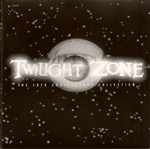
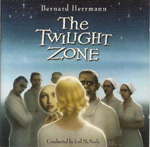
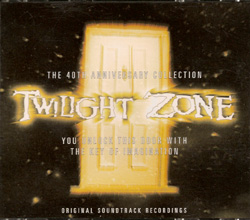
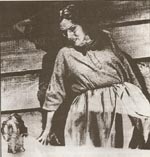
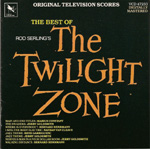
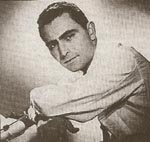
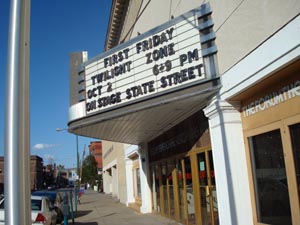
.jpg)
